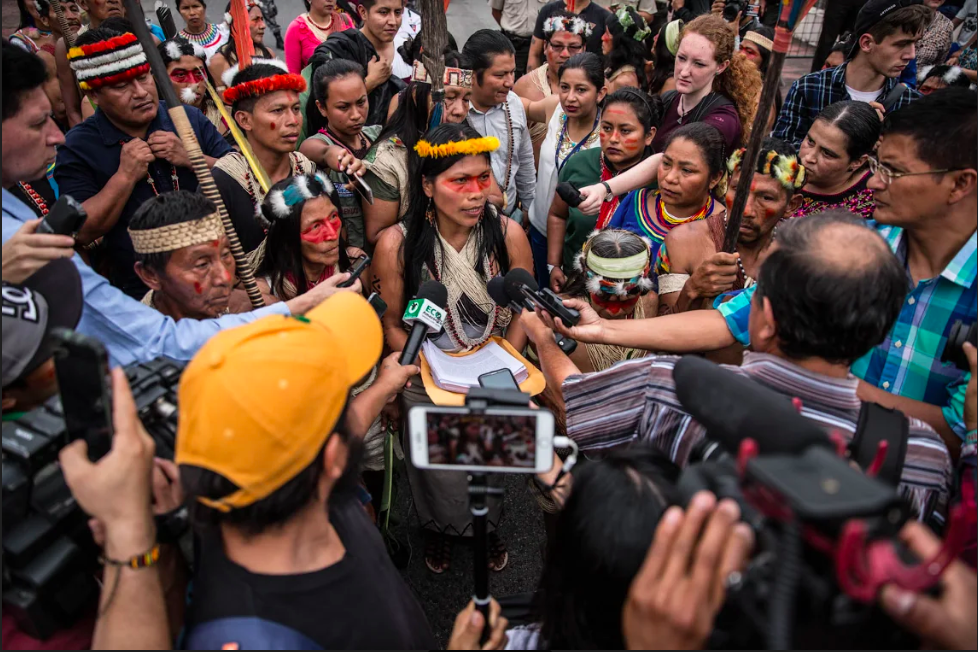Our work, and our successes, would not be possible without the critical partnership and leadership of Indigenous and frontline communities — in Indonesia, the Amazon, and the U.S.
We take the “network” in our name seriously, and work closely with global and regional partners to develop case studies, conduct undercover investigations, and unveil the ugly truth of corporate abuse. In all of our partnerships, we follow the same core principle: to use our position as an international organization to support, fund, and amplify grassroot movements on the ground where we can, because they know best how to achieve the change we all need.
Enbridge’s Line 3 Pipeline: Supporting Indigenous Leadership
Since 2017, RAN has been supporting the Indigenous-led resistance to Enbridge’s proposed Line 3 tar sands pipeline in Minnesota. In close partnership with Giniw Collective, Honor the Earth, Camp Healing Souls, Northfield Against Line 3, BIPOC Climate Justice, and Minnesota Interfaith Power and Light to name a few — we’ve trained hundreds in nonviolent direct action and mobilized dozens to take action with banner drops, action camps, mass marches, pray-ins, and Chase bank branch shut downs. Through our partnerships with Indigenous Water Protectors we’ve moved thousands of dollars in direct funding to the frontlines.With final permits for Line 3 currently pending and construction on the pipeline expected to start in early 2021, local communities and climate activists are planning continued resistance.
Targeting one of the biggest Amazon rainforest destroyers.
The Amazon rainforest and its Indigenous Peoples are under acute threat from the world’s largest asset manager, BlackRock, who’s been taking advantage of Brazil’s far-right President Jair Bolsonaro’s removal of environmental barriers to economic activities in the Amazon. BlackRock has no coherent policy addressing deforestation, human rights, or the rights of Indigenous Peoples and local communities on the frontlines of the climate crisis.
With massive investments in deforestation-risk companies, especially in the soy and beef sector, BlackRock is literally making a profit from the fires that have ravaged the Amazon rainforest. RAN amplifies and joins in solidarity with multiple actions regularly targeting BlackRock, like attention-grabbing actions in front of their HQ in New York City. We also work closely together with our partners at Brazil-based CASA Socio-Environmental Fund and Amazon Watch to provide funding and messaging help during the devastating Amazon fires in 2019 and 2020.
Blackrock: Stop Financing Amazon Destruction
Building a movement for Racial Justice.
Because Black, Indigenous, and People of Color (BIPOC) communities are most affected by environmental destruction and pollution, RAN understands that there is no environmental justice without racial justice. We work to follow the leadership of and amplify the demands from movements such as Black Lives Matter (BLM), Movement for Black Lives (M4BL), and BIPOC Climate Justice.
We have done this through directly supporting the Movement for Black Lives during the uprising after George Floyd’s murder in May 2020, to fundraising for the Hopi & Navajo Nation at the beginning of the COVID-19 crisis, to supporting action trainings at Standing Rock. Their fight is our fight because we know that systemic injustice and exploitation are at the root of climate change, deforestation, and human rights abuse. We can’t win justice here without justice everywhere.
Learn more about the Movement for Black Lives
Demanding corporations go Beyond Paper Promises.
One of our longstanding partnerships has been with local NGOs and frontline leaders in the rainforests of Sumatra, Indonesia, who are fighting plantation expansion and associated human rights abuses by pulp and paper producers like Asia Pulp and Paper (APP), APRIL, and Toba Pulp Lestari (TPL).While these companies adopted policies after years of pressure from RAN and our partners, we know that true improvement is measured on the forest floor. We continue to work with amazing leaders from the villages of Lubuk Mandarsah, Op. Bolus, Aek Lung and more, to monitor and make sure that the companies make good on their promises and implement their policies. The lived experiences in these communities are the true measure of whether or not companies are living up to their word.
Demand Pulp Producers Keep Their Promises to Communities
